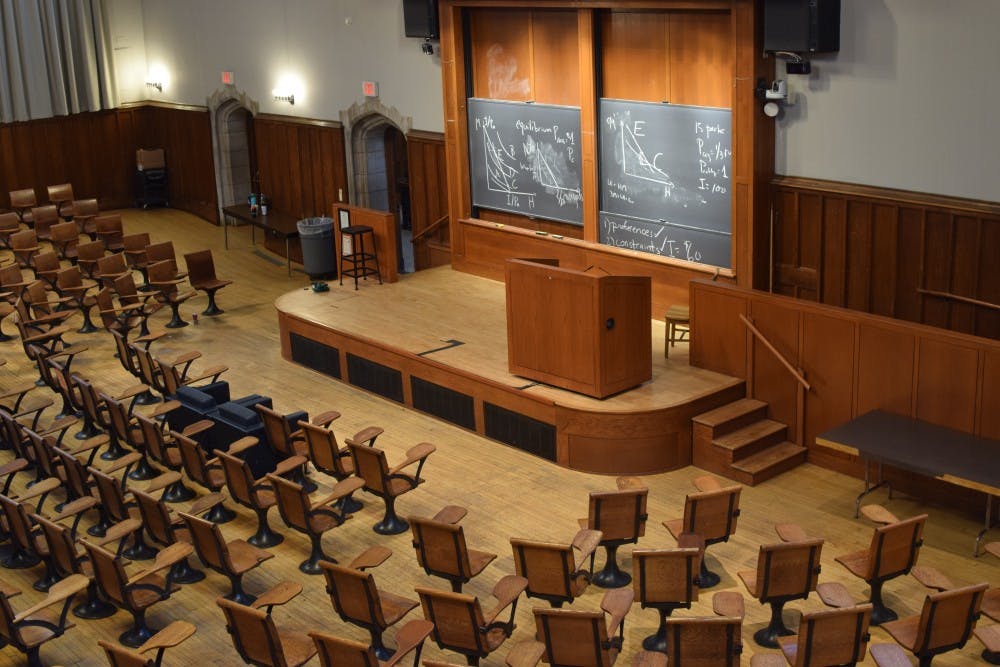Ask any first year how their courses are going, and you’ll probably hear about how challenging their writing seminar, engineering prerequisites, or first departmental class is. Princeton prides itself on its academic rigor, and students often experience this rigor most intensely in their introductory courses. While rigor is an essential part of academia here, excessive rigor in introductory classes discourages academic exploration.
Introductory courses often assign students heavy workloads and have set grade distributions, requiring them to perform well relative to their classmates to receive high grades. “Weeder” classes, lower-level departmentals known to be particularly challenging, negatively impact GPAs and become large time-sinks in students’ schedules. While departments might design these courses to ensure that students entering the department have the dedication and aptitude to excel, their difficulty leads many to completely avoid an interesting class or a department. As Liam O’Connor ’20 noted, difficulty most impacts students who went to less competitive high schools with fewer course offerings.
The impact of a tough intro class also isn’t limited to its department or the semester it was taken. A student who did poorly in an intro class could feel the need to compensate by taking “easier” classes in the next semester or exploring fewer classes outside of their comfort zone. Alternatively, someone who avoided a challenging intro course in freshman year — possibly due to lack of time or feeling less prepared than their peers — will be locked out of electives that require that missed course as a prerequisite.
These obstacles extend to post-graduate plans. A student might stop being pre-med after a difficult semester of organic chemistry. Someone who is hesitant to take MAT 215 might not consider graduate programs that require real analysis. A freshman who takes several difficult classes and underperforms in a few might be less competitive for fellowships two or three years down the line and therefore not consider applying.
In short, academic rigor can detract from academic and personal exploration — goals that should be equally important as rigor at Princeton. However, there are steps we can take to preserve rigor while encouraging exploration.
First, we should reevaluate how introductory classes are graded. While I believe that rigorous introductory courses with high standards acclimate students well to academic life at Princeton and prepare us for more advanced work, these classes shouldn’t — and don’t need to — create the pressure or risk that they currently do. MIT, also known for having an especially rigorous curriculum, mandates pass-fail grading in students’ first semester, and while Princeton need not emulate this, we should rethink whether strict grade distributions or generally harsh grading is really necessary to prepare students for future classes.
The University could also allow students to retroactively PDF a limited number of courses. While current PDF policies encourage exploration in students’ distribution requirements, they still make it risky to explore departments outside of a student’s comfort zone: students cannot PDF a departmental course, and if they do a poorly in a prerequisite for a department that they ultimately decide against majoring in, the low grade stays on their transcript. Exploring a potential major would be more feasible if a student knows that they can go back and PDF a class should they not major in the department.
Finally, we should lighten workloads at critical points in the semester. The compactness of semesters at Princeton, as Associate Opinion Editor Won-Jae Chang ’24 noted, often forces students to learn new material while preparing for midterms or final exams. My friends and I have avoided certain classes not for lack of interest but because of what others have said about the workload around midterms or finals. More reasonable workloads would not only give students more time to digest material and engage more in classes, but also encourage academic risk-taking.

Rigorous classes enrich academic life at Princeton. However, having seen how the difficulty of classes impacts students’ choices about what classes to take, what to major in, and the post-graduation plans they pursue, I believe we should prioritize exploration as much as we prioritize rigor. Let’s make academic risk-taking less risky.
Allen Liu is a senior from Chattanooga, Tenn. He can be reached at afliu@princeton.edu.









